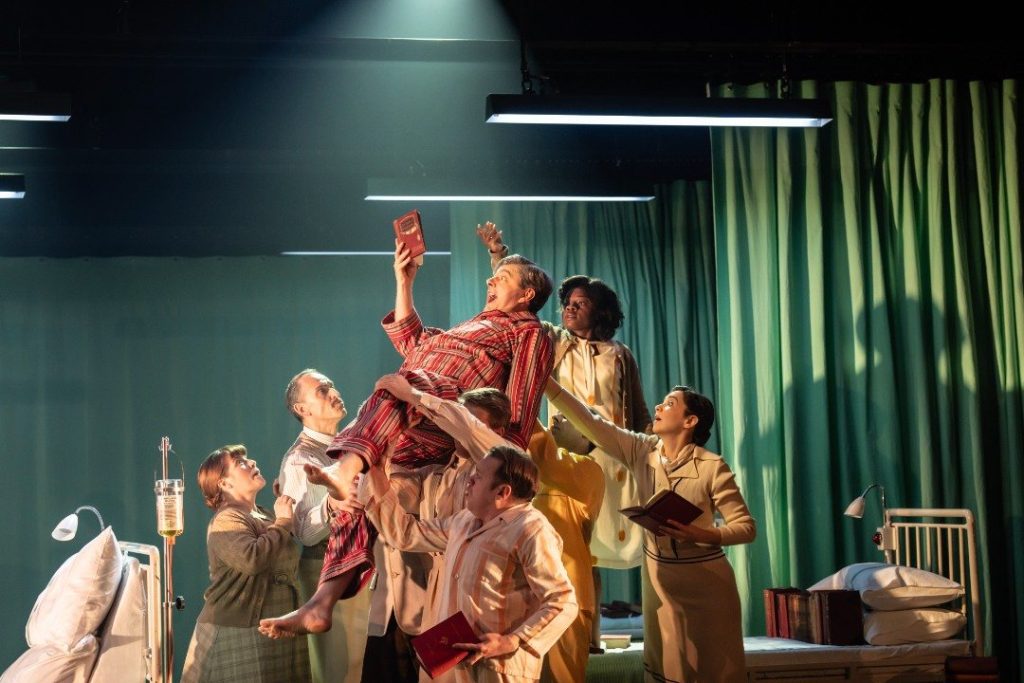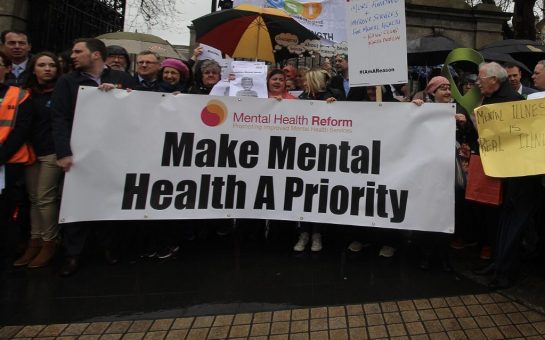Tim Price’s Nye is back on stage at the South Bank’s Olivier Theatre until August before it transfers for a limited run to Cardiff’s Millennium Centre.
An ode to the eponymous hero Aneurin ‘Nye’ Bevan (Michael Sheen), Price’s play celebrates the life of this much-lauded member of post-war social democracy.
Bevan is primarily remembered as the founder of the one socialist institution to have survived 20th-Century Britain, the National Health Service.
Induced by morphine and, unknowingly, his own impending death, Price’s Bevan commits the audience to relive key moments of his life, from the classroom and mines of South Wales to the House of Commons debate chamber and tea rooms.
An ensemble of hospital workers and patients are, Wizard of Oz-like, transformed through Bevan’s hallucinations into major figures of both his own life and the 20th century.
Battles with Neville Chamberlain (Nicholas Khan), Winston Churchill (Tony Jayawardena), and Clement Atlee (Stephanie Jacob) are married with visions of Bevan’s early memories, especially his being haunted, personally and politically, by the medieval, tortured death of his father (Rhodri Meilir).
Sheen cuts his role down to the bone.
Every deep Cambrian trochee is inflected with the star’s well-documented pride for the Welsh arts and its struggle to tell its own stories.
Touching performances by Jason Hughes and Sharon Small, as Archie Lush and Jennie Lee respectively, ensure the heart of the play’s action remains strong.

Nevertheless, previous complaints plaguing the performance’s initial run – of stunted elements, breaks in pathos, economic dialogue – could never be fixed in a re-production. There are inherent problems with Price’s script.
The playwright is to be commended though, as Dominic Cavendish in The Daily Telegraph pointed out, for not shying away from inconvenient historical elements, such as the medical establishment’s then rife conservatism – brilliantly analogised in Price’s faceless, Kafkaesque British Medical Association.
Nevertheless, the unavoidable mechanics of the play often invites serious blunder.
Ultimately, individual characters are the medium through which this story unfolds, to the the detriment of the wider historical context which a story of the NHS’ founding surely demands.
The audience of Nye is in danger of absorbing a parochial and false memory, one which airbrushes the broad, deep struggle of intellectuals, liberals, socialists and the wider organised working class for socialised healthcare, swapping it out for the indisputable but still tangential story of one man’s genius.
Some of the more egocentric elements of the play do turn out to be thoroughly enjoyable, if slightly inane.
In an anomolous sequence Sheen suddenly, and magnificently, breaks into a cover of Judy Garland’s Get Happy, with doctors and patients careering about, resembling the choreography in Danny Boyle’s NHS tribute of the London 2012 Opening Ceremony.
However, and perhaps sensing his own script’s shortcomings, Price is often regrettably content to retreat from nuance, opting instead to draw on a well of popular feeling, excavated even deeper since the pandemic, which regards the NHS as nothing short of the UK’s unofficial state religion.
In Nye, the public healthcare system is the only real object of affection, rather than the play itself.
Indeed, after the curtain-call, we see several documentary-like factoids projected onto a backing screen offering unambiguous praise for the health service’s first few years.
Sheen, still presumably in character, remains on stage, dumbfoundedly gazing at these godly interventions.
It is the final opportunity for the audience to burst into storms of applause which inevitably seem self-righteous and signalling rather than empathetic on behalf of the performance.
A fellow giant of Labour history, and a fellow son of Tredegar, Lord Neil Kinnock writes in a companion piece to the play that Bevan represented “the unbending determination to make civilisation conventional by implementing, enabling and liberating practical policies”.
Kinnock is right: meliorism truly was the Bevanite superpower.
It permitted the unthinkable to happen, empowering the war-ravaged, impoverished and patronised working classes of 1945 to see through none other than Churchill, and his sinister drivel about the welfare state requiring a Gestapo.
It’s an ironic shame that Price’s play isn’t similarly able to ward off cynicism without delving into unthinking worship of another national institution.
Feature image: Johan Persson





